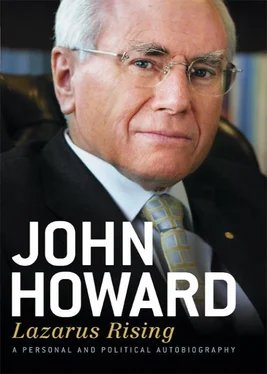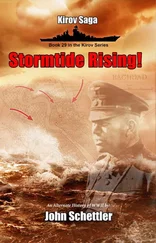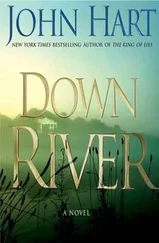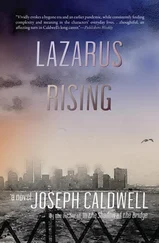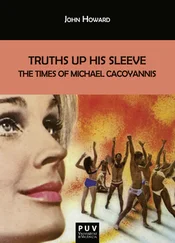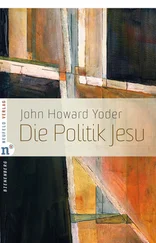The 1969 election saw Harold Holt’s 1966 majority of 38 reduced to seven. Whitlam outperformed Gorton during the campaign. At one stage, there had been real concern that Gorton might lose. He came to Mackay’s electorate, where I presided at a Liberal Party dinner held at the Western Suburbs Leagues Club, in Ashfield. He was late for the dinner because he had detoured to the members’ room of the club to have a game of darts and a beer with local club members. Some at the dinner were aggravated by this, but next morning a marvellous photo appeared in the Sydney Morning Herald showing the Prime Minister throwing darts. This kind of behaviour now by prime ministers would be regarded as quite commonplace and natural, but 40 years ago it was seen by some as unconventional.
John Gorton made no secret of his liking for parties and conviviality. This would not have mattered if he had applied more discipline and routine hard work to the job of being prime minister. He had an appealing personality, a direct style and was extremely intelligent. It was his lack of general discipline over such things as punctuality that did him damage. I had not been attracted to him when he was chosen as the party’s leader and would have preferred Paul Hasluck, but several people close to me, such as Tom Hughes, were strong Gorton supporters, and suffered in their own careers when Gorton was later removed as prime minister. I maintained my scepticism throughout his time in office. In later years, however, I changed my mind about Gorton.
The experience of government led me to identify more strongly with Gorton’s nationalistic views. During the last few years of his life I saw him and his wife, Nancy, often, and I felt that we had become quite good friends, overcoming earlier estrangement on account, firstly, of my closeness to Malcolm Fraser, whom he loathed, and my rivalry with Andrew Peacock, who had been a Gorton supporter. I spoke at a wonderful dinner to mark Gorton’s 90th birthday on 7 September 2001 and felt honoured to launch his biography, written by Ian Hancock.
Although he won the 1969 election, Gorton lost a lot of seats and had to beat off leadership challenges from both David Fairbairn, a senior minister from New South Wales, and Bill McMahon, then still deputy Liberal leader. By this time, John McEwen had dropped his veto of McMahon, a sure sign that the Country Party had grown uneasy with Gorton’s governing style.
It was an inauspicious start to a new term of government, having an incumbent prime minister challenged by two of his ministers. Gough Whitlam’s impressive performance in the campaign added to the list of ominous signs. Yet so lengthy had been the Coalition’s grip on power that the possibility of being defeated by Labor was still not seriously entertained by many people.
About this time, my brother Bob began to question his earlier support for the Liberals, and by the early 1970s he had joined the ALP. I respected his right to change his opinion and his political allegiance and, for that reason, I never asked him exactly why he had shifted. Over the years I divined that it had been a case of two people growing up in the same environment ultimately having a different take on events and society. For example, where I responded positively to people defeating disadvantage by personal initiative, Bob was repelled by the disadvantage and the fact that not all people could overcome it. That is where he saw a larger role for government. He opposed Australia’s involvement in the Vietnam War, but that was a companion to his change of political heart, not the main driver.
For several years Bob had been a Liberal Party member. Like me, he is an activist, and he became quite heavily involved in the local branches in the Earlwood area. He and his wife were living there. Later, and after they had moved to Armidale so that Bob could continue his studies at New England University, his political leanings shifted.
Although her personal commitment to the Liberal cause never faltered, our mother worried that politics would divide Bob from the rest of the family. Sometimes she asked that we steer clear of too many political discussions when all of us were together. Mum was especially anxious about our traditional family gathering on Christmas night, 1975. Bob, by then a staunch Labor man, was in high dudgeon about the dismissal of the Whitlam Government, and had been shattered by the electoral rout of his party. To cap it all, his young brother had just been made a minister by the dreaded Malcolm Fraser. It was a bit tense, but we made it.
Both of us were determined not to allow our political differences to come between us and, although we had plenty of intense arguments, particularly over the 1975 dismissal of Whitlam, this did not happen. By contrast Wal and Stan, my other brothers, who had always been Liberal followers, increased their active involvement and support, particularly after I entered parliament. Wal had been an enthusiastic branch office-bearer for years, and Stan would help out in a variety of ways, including with fund-raising.
In the 33 years that I was in parliament, including some of those difficult opposition years, Wal and Stan were loyal and consistent backers. They were the ultimate in true believers. And it was not just the loyalty that I valued. As a small businessman for much of his working life, Wal was a constant window into a world so important to the Liberal Party’s base of support. Stan was a senior partner for many years in one of Australia’s largest legal firms (Mallesons) and his professional activities gave him insights into the thinking of corporate Australia. In different ways they were both great sources of counsel and advice.
During the years that I was Prime Minister, Wal, Stan and their families joined Janette, me and our children in election-night celebrations (commiserations on one occasion), as well as other landmark events. Naturally Bob did not. He did, however, find personal ways of marking my success, consistent with his ongoing Labor convictions. When I was sworn in as Prime Minister on 11 March 1996, Bob came to the first part of the ceremony, when I took my oath of office alongside Tim Fischer as Deputy Prime Minister. Bob gave the rest a miss; that involved the swearing in of the remainder of the new Government. ‘You’ve got to draw the line somewhere,’ he joked. Likewise, he didn’t come to a large Liberal Party celebration of my 30 years in parliament in 2004, but instead asked me and my family to his home for a dinner to mark the occasion. Today we continue to discuss politics in an avid fashion, but with a sense of detachment.
My mother left me with a fount of old aphorisms and sayings, some of which endure today, others having slipped out of usage. ‘It’s a long road that has no turning’ is one that has largely disappeared. ‘Blood is thicker than water', though, remains a reasonably commonplace expression. It most certainly applied to the way my family handled political differences within.
5 ‘THE ONLY GAME IN TOWN’
The year 1970 was to be, for me, at a personal level, momentous. On 14 February I met Janette Parker, and was immediately smitten. She was a fantastic mix of brains and good looks. Fittingly, I suppose, the meeting had a political context. There was a by-election that day for the seat of Randwick, in the NSW Legislative Assembly. The previous incumbent, Lionel Bowen, had been elected as the federal Labor member for the seat of Kingsford Smith at the election late in 1969. The Labor candidate for Randwick was a very youthful Laurie Brereton, who became a senior minister both in state and federal Labor governments.
Janette had agreed to hand out how-to-vote tickets for the Liberal candidate, John McLaughlin, who, by coincidence, had been a law school colleague of mine a decade earlier. He had no chance of winning, and the Liberal campaign was very much a flag-flying exercise.
Читать дальше
